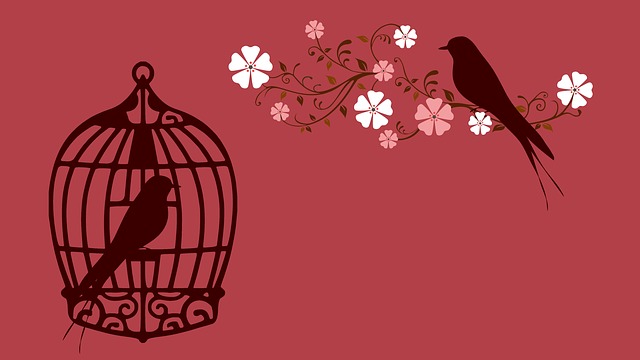Lovebirds are most well known for inspiring the phrase based on their name, usually reserved for how in love and infatuated people can be with each other. That’s why people asking whether death actually occurs as a result of 2 lovebirds separating does make some sense.
To answer this question lovebirds will not die if separated from their partner or flock. Grieving and loss of appetite is what’s most likely to happen, in which case you definitely should try to help your little lovebird grieve healthily as it’s still possible to die from a broken heart.
On the other hand, if you separate 2 lovebirds that have formed a bond from 1 cage into 2 separate ones, they most certainly will not die although this will still affect them as you’ll notice the birds getting irritated longing for the others presence and interaction.
Why Could A Lovebird Die When Separated?
When the love of your life passes away, it’d probably flip our world upside down right?
Animals and birds have feelings and can get attached to others therefore, it makes that a lovebird would grieve as much if not more than us in situations where they are permanently separated from a partner that they’ve developed a strong bond with.
When grieving the bird will not be up for doing anything. The lovebird will likely lose their appetite, you’ll start seeing specific things such as their feathers being fluffed or even escalated aggression.
As a result if they aren’t looked after in these time of grief, it is possible for the these little parrots to die from sadness or through starvation if you’re not hands on enough to make sure they’re eating.
How Often Do Lovebirds Die When Separated From Their Partner?

Some instances require you to separate 2 lovebirds as one may be acting violently against the other. Obviously in this situation it’s better that the lovebirds be separated otherwise, fights might break out causing injury or even death.
In other instances where a bonded pair dies or if the pair are separated, it’s still very rare for the remaining lovebird, even without your care or support, to die.
Although they are monogamous by nature, after they have mourned the deceased, they are eventually willing to partner up with another, specifically in the wild where a lovebird may partner up with someone else in their flock.
That’s why it’s hard to say exactly how often a lovebird would die if separated. It’s likely to be a very very small number.
How Will Being Separated Affect A Lovebirds Health?
There are a variety of actions a lovebird may showcase if they’re ever separated indefinitely from their partner.
These may include:
- Searching for their deceased partner in the cage
- Loss of appetite
- Call out for them more frequently
- Be less eager to play
- Excessive head bobbing
- More aggressive than normal
- Irregular sleeping pattern
- Puffy feathers
If you notice any of these, there’s a good chance your lovebird is grieving, in which case I’d advise you help them get through and process everything in the best way you know.
How Can You Support Your Lovebird As It Mourns?
A lovebird’s mourning period isn’t very long, in most cases it will take these little parrots a few weeks to adjust to their new environment but, this doesn’t detract from the fact this moment is by far the worst it may have in its lifetime.
If you want to support your little bird there are a few things you could do.
You can start paying it more attention and love. If you’ve known your little bird for a good while you’ll understand that when you walk into the room the little chirper speaks to you. That’s because it has accepted you into its flock, meaning they trust you.
Obviously as there’s trust between the two of you they’ll appreciate your presence in these hard times. If you’re by their side, speaking in a calming tone, gifting their favourite foods and even giving your lovebird some new toys to play with, it will help your feathered buddy process the situation in a more healthy way.
Grieving can take anywhere from a few days up to a few weeks, that’s why make sure that within these trying times you support your lovebird as much as possible.
It will take time but, by continuing to care for them it’ll help speed up the recovery and in turn, adjusting to the new normal.
Summary
Losing a loved one is extremely painful for lovebirds whom thrive off the bond they make with their partners. That’s why it makes complete sense for them to grieve as they do.
However, chances are they won’t pass on from this process. In reality they definitely will mourn and their behaviour will show that but, given enough time and if you provide your lovebird with enough care, it will slowly yet surely adapt to the lack of their separated partner and get on with their new life solo.
Of course you could introduce them to another lovebird however, to have them form another strong bond would be far from easy.
References
https://www.animalwised.com/can-lovebirds-live-on-their-own-3480.html
https://www.birdcagesnow.com/blogs/bird-blog/do-budgies-grieve
Amhil Khan, a dedicated nature enthusiast and the founder of BirdsOfTheWild.com, is a passionate advocate for the captivating world of avian wonders. With a deep-seated curiosity about the intricate lives of birds, Amhil’s journey began as a fascination and has evolved into a mission to inspire others to appreciate and protect these magnificent creatures.
Amhil’s love for birds led to the creation of Birds of the Wild, a platform where his expertise in ornithology, coupled with his captivating storytelling, provides readers with an immersive and educational experience. Through his lens and words, he captures the essence of birds in their natural habitats, offering a glimpse into their behaviors, migrations, and the ecosystems they inhabit.

